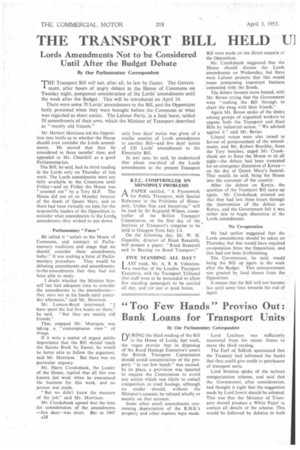THE TRANSPORT BILL HELD Ui
Page 30

If you've noticed an error in this article please click here to report it so we can fix it.
Lords Amendments Not to be Considered Until After the Budget Debate
By Our Parliamentary Correspondent
THE Transport Bill will not, after all, be law by Easter. The Government, after hours of angry debate in the House of Commons on Tuesday night, postponed consideration of the Lords' amendments until the week after the Budget. This will be introduced on April 14. There were some 70 Lords' amendments to the Bill, and the Opposition hotly protested when they were brought before the Commons at what was regarded as short notice. The Labour Party, in a final burst, tabled 50 amendments of their own, which the Minister of Transport described as "mostly old friends."
Mr. Herbert Morrison led the Opposition into battle as to whether the House should even consider the Lords amendrnents. He moved that they be considered in three months' time, and appealed to Mr. Churchill as a good Parliamentarian.
The Bill, he said, had its third reading in the Lords only on Thursday of last week. The Lords amendments were not fully available to the Commons until Friday—and on Friday the House was "counted out" by a Tory M.P. The House did not sit on Monday because of the death of Queen Mary, and so there had been virtually no time for the responsible leaders of the Opposition to consider what amendments to the Lords amendments they wished to put down.
Parliamentary " Farce " • He called it "unfair to the House of Commons, and contrary to Parliamentary traditions and usage that we should consider these amendments today." It was making a farce of Parlia mentary procedure. They would be debating amendments and amendmentsto-the-amendments that they had not been able to study.
doubt whether the Minister himself has had adequate time to consider the amendments to the amendments— they were not in his hands until yesterday afternoon," said Mr. Morrison.
Mr. Lennox-Boyd intervened. "I have spent the last five hours on them," he said. "But they are mainly old friends."
That, snapped Mr. Morrison, was taking a " contemptuous view" of things.
If it were a matter of urgent public importance that the Bill should reach the Statute Book by Easter, he would be better able to follow the argument, said Mr. Morrison. But there was no particular urgency
Mr. Harry Crookshank, the Leader of the House, replied that all this was known last week when he announced the business for this week, and no protest was made.
"But we didn't know the measure of the job," said Mr. Morrison.
Mr. Crookshank agreed that the time for consideration of the amendments —five days—was short. But in 1947 A28 only four days' notice was given of a similar number of Lords amendments to another Bill—and five days' notice of 120 Lords' amendments to the Electricity Bill.
In any ease, he said, he understood that about one-third of the Lords amendments to the present Transport Bill were made on the direct concern of the Opposition.
Mr. Crookshank suggested that the House should discuss the Lords amendments on Wednesday, but there were Labour protests that this wou,id mean postponing important business connected with the floods.
The debate became more heated, with Mr. Bevan crying that the Government were "rushing the Bill through to share the swag with their friends."
Again Mr. Bevan spoke of the desire among groups of organized workers to oppose both the Transport and ,Steel Bills by industrial action. "We advised against it" said Mr. Bevan. Liberal voices were also raised in favour of postponement of the amendments, and Mr. Robert Boothby, from the Tory benches, urged Mr. Crookshank not to force the House to sit all night—the debate had been truncated for an emergency discussion of Kenya— on the day of Queen Mary's funeral. That would, he said, bring the House into the contempt of the country.
After the debate on Kenya, the question of the Transport Bill came up again. Mr. Crookshank pointed out that they had lost three hours through the intervention of the debate on Kenya, and the Government felt it was rather late to begin discussion of the Lords amendments.
No Co-operation He had earlier suggested that the Lords amendments should be taken on Thursday, but that would have required co-operation from the Opposition, and that had not been forthcoming.
The Government, he said, would bring the Bill up again in the week after the Budget. This announcement was greeted by loud cheers from the Opposition.
It means that the Bill will not become law until some time towards the end of April.




























































































